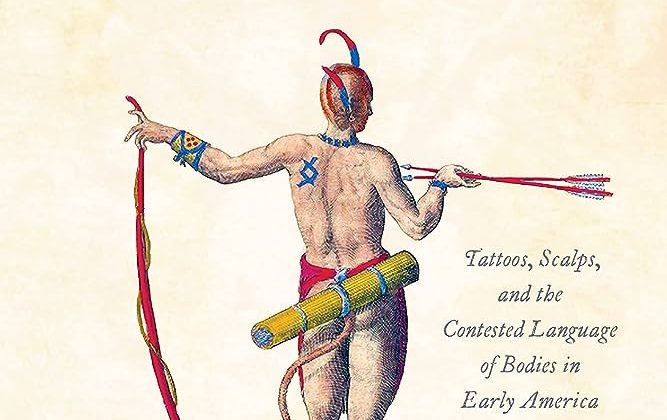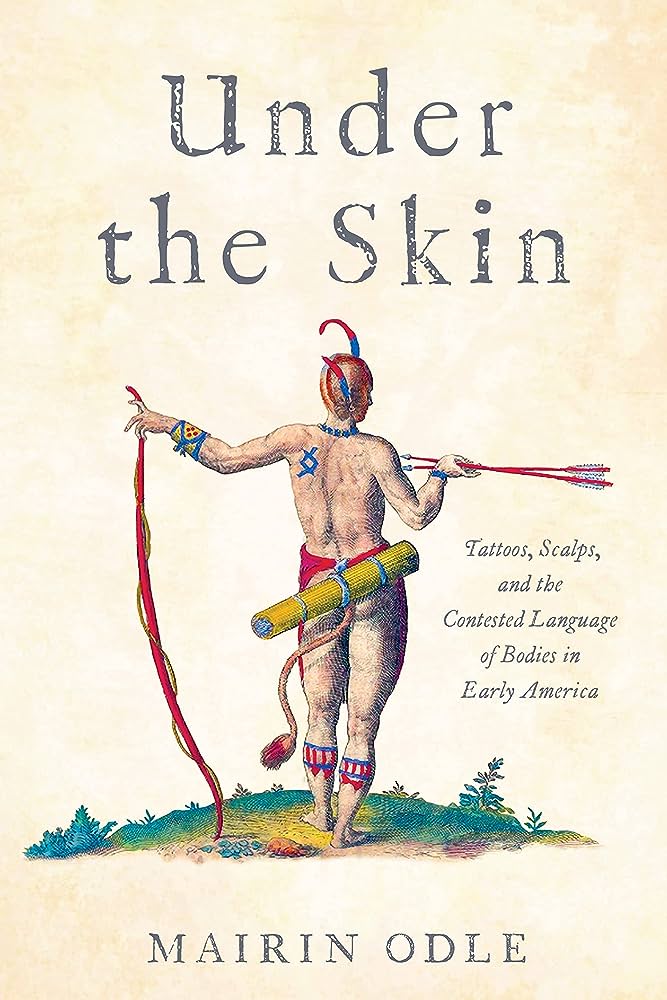

Mairin Odle is Associate Professor and Director of Graduate Studies in American Studies at the University of Alabama. This interview is based on her book, Under the Skin: Tattoos, Scalps, and the Contested Language of Bodies in Early America (University of Pennsylvania Press, 2022).
JF: What led you to write Under the Skin?
MO: The origins of this project go all the way back to my undergraduate senior thesis. I was writing about something completely different, but pulled a source that mentioned an incident where a Lenape man was scalped by Pennsylvania colonists—and he survived. I couldn’t forget that story and all the questions it raised: about the perpetrators, about the scalping survivor, and about the ways that cross-cultural interactions could physically mark people. Some years later I started this project to explore what people in early America did about scars they couldn’t escape: how it affected ideas of their personal or collective identities, and what sorts of policies or behaviors these marks set in motion.
JF: In 2 sentences, what is the argument of Under the Skin?
MO: Tattooing and scalping were crucial tools in the cultural and political contests between Natives and newcomers in early America. Body modification practices with Indigenous origins found a place on colonial skin and within colonial imaginations, shaping the era’s debates about the nature of human and societal difference.
JF: Why do we need to read Under the Skin?
MO: The colliding cultures of early America paid close attention to the unfamiliar appearances of strangers—and I think we should pay attention to what they were paying attention to! Beyond just observing appearance, people also attempted to change their own bodies and those of others, and those transformations were intended to make stories real: stories about power, alliance and allegiance, domination and resistance, and the performance of social roles. Settlers co-opted and rewrote a range of Native American practices, including those that were intimate, tactile, embodied experiences, and in doing so created patterns in American culture that echo into the present—whether that’s in the misuse and misunderstanding of Indigenous tattooing, or in the way that film and literature have tended to depict scalp-taking and scalping survivors as lurid justifications of American expansionism. And I hope, in addition to some of those big theoretical points, that the book’s accounts of marked individuals are simply interesting—that their stories leave readers with a more complex and dynamic image of the lives of early Americans.
JF: Why and when did you become an American historian?
MO: Well, while I’m trained as a historian, I’m very happily interdisciplinary in my interests and approaches, and I teach in an American Studies department. My fascination with the past started at a young age, probably as a result of my family going antiquing a lot: I liked imagining who had made these interesting things and who had owned them. And then in college I had exceptional professors, people who pointed me toward the diverse, bustling, intriguing societies of early America, Native America, and the Atlantic world. I came out of those classes realizing that if I made those fields my focus, I’d never run out of stories to learn and to share.
JF: What is your next project?
MO: My next book moves into the nineteenth century, tracing the intersecting lives of Seminoles, self-emancipated former slaves, and white settlers in the Florida borderlands of the Second Seminole War. I’m following the stories of a settler woman, an Indigenous child, and a formerly enslaved sailor and the narratives crafted about them by an Englishman who was both a doctor and an author. This project is not only exploring how these unlikely individuals ended up intersecting with some of the most famous events and famous people of the era, it’s exploring biography and life-writing matter in both the early nineteenth century and in our current moment. Who writes and speaks for others—both then and now?
JF: Thanks, Mairin!